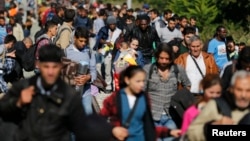European Union leaders, facing a massive migrant crisis, have agreed to give $1.1 billion to international aid agencies helping refugees at camps near their home countries.
European Council President Donald Tusk made the announcement after an emergency summit in Brussels ended early Thursday.
He said the leaders from the 28 EU countries agreed on increased aid to countries like Lebanon, Jordan and Turkey, which are hosting millions of refugees from war-torn Syria.
The leaders also agreed to set up "hot spots'' by the end of November where EU experts can quickly register and identify people eligible for refugee protection, Tusk said.
The move is intended to also quickly filter out economic migrants who are unlikely to qualify for asylum in Europe.
He did not say whether the countries had reached an understanding on how to cope with the thousands of asylum-seekers streaming to Europe, even after interior ministers adopted a country-by-country quota plan Tuesday to disperse 120,000 migrants throughout the 28-nation bloc.
Slovakia, one of four countries that voted against the quota proposal, said it would not accept any refugees and would sue to challenge the plan. Hungarian Prime Minister Viktor Orbán attacked German Chancellor Angela Merkel for her support of the quotas, calling it "moral imperialism."
But Romania, another quota opponent, said it would accept the additional 2,400 migrants called for in the quota system. Poland, which initially objected to the quotas, said it would take in about 5,000 in addition to another 2,000 it had earlier agreed to accept.
Former Polish President Bronislaw Komorowski said, "The problem is not 'how many,' but 'how.' It doesn't make sense to say: Let's host everyone. But it doesn't make sense to threaten, either, and to build a xenophobic atmosphere."
Ahead of the summit, EU President Donald Tusk told the heads of state in a letter, "There is a long list of issues where we could blame one another, but it will not help us in finding a common solution." He said the EU leaders "must absolutely work out policies that we can implement in order to help each other."
Germany has by far accepted the biggest number of refugees. But Berlin's intelligence chief, Hans-Georg Maassen, warned Tuesday that radical Islamists already in Germany could try to recruit refugees for terrorist attacks on the pretext of offering them humanitarian assistance.







